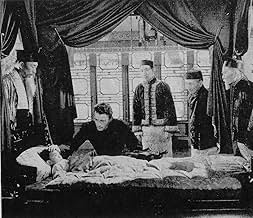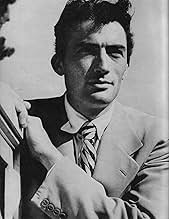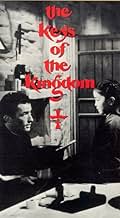VALUTAZIONE IMDb
7,2/10
3310
LA TUA VALUTAZIONE
Un giovane sacerdote viene inviato in Cina per fondare una parrocchia cattolica.Un giovane sacerdote viene inviato in Cina per fondare una parrocchia cattolica.Un giovane sacerdote viene inviato in Cina per fondare una parrocchia cattolica.
- Regia
- Sceneggiatura
- Star
- Candidato a 4 Oscar
- 2 vittorie e 5 candidature totali
Rose Stradner
- Rev. Mother Maria-Veronica
- (as Rosa Stradner)
Cedric Hardwicke
- Monsignor at Tweedside
- (as Sir Cedric Hardwicke)
Recensioni in evidenza
A good adaptation of AJ Cronin's famous book by a melodrama expert John Stahl,and a great actor,Gregory Peck,as good as ever.A fine appearance by Roddy McDowall as Francis as a boy.
Good scenes: the priest whose idea of Christianity comes up against a retrograde hierarchy,Francis's parent's death,the nuns arriving at the mission.But my favorite scene will remain the death of Francis 's friend, a man who does not believe in God,what the holier-than-thou would call a heathen person,but one good fellow who gave his life to help the priest.This is one of those absorbing tales which were very long but where you never got bored.
Good scenes: the priest whose idea of Christianity comes up against a retrograde hierarchy,Francis's parent's death,the nuns arriving at the mission.But my favorite scene will remain the death of Francis 's friend, a man who does not believe in God,what the holier-than-thou would call a heathen person,but one good fellow who gave his life to help the priest.This is one of those absorbing tales which were very long but where you never got bored.
This is an interesting story about a priest Father Francis Chisholm(Gregory Peck), who went to China to establish a parish. He never wanted to get money easily, for him was much more important to get more people really devoted to catholicism than to get funds from any people, and for this he made all efforts serving even as a doctor in the community. Another important aspect shown although not deep, was the difference among the priests. Some are humble like the hero of the film but others are arrogant and look more for the wealth of the church instead of looking for the wealth of poor people. Catholicism have lost many areas because of the lack of sacrifice of many of its priests otherwise it would reign nearly everywhere in the world. Priests like Father Chisholm would have been the salvation.
What a wonderful story of a man, despite much adversity, contributes himself to the Chinese community he loves so much. It is amazing how Peck makes it so effortless (even in his only second film)in portraying a young man to one in his twilight years. He personifies morality and quiet integrity in this film, reminiscent to the role that he would play nearly twenty years later in TO KILL A MOCKINGBIRD.
The supporting cast which performs more than ably is led by Cedric Hardwicke playing a monsignor who was initially critical of the Peck character but emerges having respect for him after reading his memoirs (which form the narration for the film. Others include Thomas Mitchell as the irreverent self-proclaimed atheist who does much to provide the witty humour for the film, Edmund Gwenn as Peck's plucky mentor at the seminary who uses the term "ecclesiastical mechanic" to describe priests who are inflexible and bureaucratic, and Rose Stradner as the Mother Superior who falls in love with Peck (you only get a hint of this).
One of the highlights is the film's efforts in portraying the Chinese in a sensitive manner in terms of the customs shown and dialects used. This is very unlike films of its era which tended to portray Asians in a more stereotypical fashion.
The supporting cast which performs more than ably is led by Cedric Hardwicke playing a monsignor who was initially critical of the Peck character but emerges having respect for him after reading his memoirs (which form the narration for the film. Others include Thomas Mitchell as the irreverent self-proclaimed atheist who does much to provide the witty humour for the film, Edmund Gwenn as Peck's plucky mentor at the seminary who uses the term "ecclesiastical mechanic" to describe priests who are inflexible and bureaucratic, and Rose Stradner as the Mother Superior who falls in love with Peck (you only get a hint of this).
One of the highlights is the film's efforts in portraying the Chinese in a sensitive manner in terms of the customs shown and dialects used. This is very unlike films of its era which tended to portray Asians in a more stereotypical fashion.
Before getting started I should confess that I am an unabashed worshipper of Mr. Gregory Peck. In mourning his death, I resolved to track down and watch those few of his films that I hadn't yet seen. The Keys of the Kingdom came early in the process and was a delighful surprise. I admit, I had rather low expectations knowing that this was only his second film. Nevertheless, Greg shines as brightly in this as he does in so many of his later films. Thomas Mitchell (best known as Uncle Billy in It's a Wonderful Life) is also charming as the atheist best friend to Peck's priest.
The movie explores the unusual tension within the church between succeeding at being a good person and succeeding at climbing the ecclesiastical ladder. As you might guess, Peck plays to type as the good-hearted priest who never quite gains the respect of his superiors. Look for Vincent Price as an example of the latter; a less than caring priest who is consistently promoted.
This is a charming albeit slightly sentimental film that I hope to see available in DVD format someday. Until then it is well worth the effort it might take to track it down.
The movie explores the unusual tension within the church between succeeding at being a good person and succeeding at climbing the ecclesiastical ladder. As you might guess, Peck plays to type as the good-hearted priest who never quite gains the respect of his superiors. Look for Vincent Price as an example of the latter; a less than caring priest who is consistently promoted.
This is a charming albeit slightly sentimental film that I hope to see available in DVD format someday. Until then it is well worth the effort it might take to track it down.
The trailer for "The Keys of the Kingdom" compares the 1944 film to the prior classics "Goodbye Mr. Chips" and "How Green Was My Valley," and the comparisons are apt. Like the two earlier films, "The Keys of the Kingdom" is the narrated story of a man's life with present-day scenes as bookends. All three films follow ordinary men who leave indelible legacies, but fail to grasp the worth of their own accomplishments. While Mr. Chips is an English teacher and young Huw Morgan is a Welsh miner's son, Father Francis Chisholm is a Scottish missionary priest in China.
In this well written adaptation of the A. J. Cronin novel by Joseph L. Mankiewicz and Nunnally Johnson, Gregory Peck underplays the role of Francis Chisholm effectively and with the solid dignity that distinguished Peck's long career. In only his second screen role, Peck is a Christ-like figure who accepts people as they are, which puts him at odds with the dogmatic bureaucrats that run his church. Vincent Price is colorful as Angus Mealy, an ambitious fellow priest who puts personal advancement above godliness, and Thomas Mitchell is equally fine as Willie Tulloch, a doctor who puts his service to humanity above religion. Besides Price and Mitchell, the film has a rich cast of such other outstanding character players as Edmund Gwen, Anne Revere, Cedric Hardwick, Sara Allgood, Benson Fong, and Roddy McDowall. Each of these fine performers makes even the smallest role memorable. While Rose Stradner is fine as the Reverend Mother, the film treads a delicate line with its subtle hint at a love story between her and Father Chisholm. Perhaps there was an underlying attraction between the two that went beyond mere friendship, but, if so, that was daring territory to explore during the 1940's.
While "Keys of the Kingdom" runs more than two hours, the engrossing story should hold the attention of viewers who loved "How Green Was My Valley" and "Goodbye Mr. Chips." The film provides an emotional payoff that equals those in the earlier films, and damp eyes and a sniffle or two will likely affect even the hardest hearts. While at times sentimental in the best sense of the word, "The Keys of the Kingdom" also has an important message of acceptance that is particularly relevant today. Father Chisholm does not criticize "heathens" or "atheists," but rather respects their points of view and loves them for their good deeds regardless of their philosophies. When one of Chisholm's non-believer friends lays dying, the priest does not pressure him to convert on his deathbed, and the dying man thanks his friend for his respect and for allowing him to die as he had lived. The film certainly makes a strong point when the kindest, most generous works were those done by the non-believers, the doctor and Mr. Chia, the Chinese landowner, while the most selfish individual was the self-serving social-climbing priest played by Vincent Price. Peck's acceptance of and offer of friendship to the Protestant missionaries was yet another example of the man's Christianity, which placed him at odds with his own church and did more to illustrate Christ's message than the bureaucratic church hierarchy that would not even send money to fund the mission and told him to convert people of means. Although there are a few slow stretches and the finished film is not the classic that its creators intended, "The Keys of the Kingdom" is rewarding and a showcase for a young Gregory Peck, who was poised at the dawn of his stardom.
In this well written adaptation of the A. J. Cronin novel by Joseph L. Mankiewicz and Nunnally Johnson, Gregory Peck underplays the role of Francis Chisholm effectively and with the solid dignity that distinguished Peck's long career. In only his second screen role, Peck is a Christ-like figure who accepts people as they are, which puts him at odds with the dogmatic bureaucrats that run his church. Vincent Price is colorful as Angus Mealy, an ambitious fellow priest who puts personal advancement above godliness, and Thomas Mitchell is equally fine as Willie Tulloch, a doctor who puts his service to humanity above religion. Besides Price and Mitchell, the film has a rich cast of such other outstanding character players as Edmund Gwen, Anne Revere, Cedric Hardwick, Sara Allgood, Benson Fong, and Roddy McDowall. Each of these fine performers makes even the smallest role memorable. While Rose Stradner is fine as the Reverend Mother, the film treads a delicate line with its subtle hint at a love story between her and Father Chisholm. Perhaps there was an underlying attraction between the two that went beyond mere friendship, but, if so, that was daring territory to explore during the 1940's.
While "Keys of the Kingdom" runs more than two hours, the engrossing story should hold the attention of viewers who loved "How Green Was My Valley" and "Goodbye Mr. Chips." The film provides an emotional payoff that equals those in the earlier films, and damp eyes and a sniffle or two will likely affect even the hardest hearts. While at times sentimental in the best sense of the word, "The Keys of the Kingdom" also has an important message of acceptance that is particularly relevant today. Father Chisholm does not criticize "heathens" or "atheists," but rather respects their points of view and loves them for their good deeds regardless of their philosophies. When one of Chisholm's non-believer friends lays dying, the priest does not pressure him to convert on his deathbed, and the dying man thanks his friend for his respect and for allowing him to die as he had lived. The film certainly makes a strong point when the kindest, most generous works were those done by the non-believers, the doctor and Mr. Chia, the Chinese landowner, while the most selfish individual was the self-serving social-climbing priest played by Vincent Price. Peck's acceptance of and offer of friendship to the Protestant missionaries was yet another example of the man's Christianity, which placed him at odds with his own church and did more to illustrate Christ's message than the bureaucratic church hierarchy that would not even send money to fund the mission and told him to convert people of means. Although there are a few slow stretches and the finished film is not the classic that its creators intended, "The Keys of the Kingdom" is rewarding and a showcase for a young Gregory Peck, who was poised at the dawn of his stardom.
Lo sapevi?
- QuizTellingly, the film was made during the long interim of the Chinese Civil War when hostilities between Chinese nationalists and the Communists were suspended in order to fight off the Japanese invasion during World War II.
- BlooperIn the scene where Father Francis Chisholm (Gregory Peck) is leaving his mission in China after being ordered into retirement, the children are heard singing his favorite hymn as he steps from the car, but when the camera shows the children singing, it is obvious that they are mouthing something entirely different from what is being heard.
- Citazioni
[last lines]
Father Francis Chisholm: Well, man, don't stand there with half the morning gone - get the rods!
[Andrew fetches the fishing poles]
Father Francis Chisholm: Come along, boy. Wasn't it just fine of God to make all the rivers and fill them all with little fishes and then send you and me here to catch them, Andrew? Hm?
- ConnessioniFeatured in Gregory Peck: His Own Man (1988)
I più visti
Accedi per valutare e creare un elenco di titoli salvati per ottenere consigli personalizzati
- How long is The Keys of the Kingdom?Powered by Alexa
Dettagli
Botteghino
- Budget
- 3.000.000 USD (previsto)
- Tempo di esecuzione2 ore 17 minuti
- Colore
- Proporzioni
- 1.37 : 1
Contribuisci a questa pagina
Suggerisci una modifica o aggiungi i contenuti mancanti






































